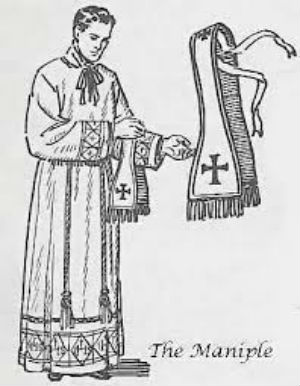
 ANY CATHOLICS are totally unfamiliar with the maniple, inasmuch as they may never have seen one. So first, by way of description, the maniple is a piece of decorated cloth worn by the priest over his left arm. Coming into use by at least the 6th century, maniples vary widely in their shape, size, and ornamentation. In general form, a maniple looks like a mini stole with clasps or strings. Its use is neither required nor forbidden in the Ordinary Form, but it is required when the Extraordinary Form is offered.
ANY CATHOLICS are totally unfamiliar with the maniple, inasmuch as they may never have seen one. So first, by way of description, the maniple is a piece of decorated cloth worn by the priest over his left arm. Coming into use by at least the 6th century, maniples vary widely in their shape, size, and ornamentation. In general form, a maniple looks like a mini stole with clasps or strings. Its use is neither required nor forbidden in the Ordinary Form, but it is required when the Extraordinary Form is offered.
The prayer that accompanies the vesting with the maniple is as follows (notice the rhyme):
Merear, Domine, portare manipulum fletus et doloris; ut cum exsultatione recipiam mercedem laboris.
May I deserve, O Lord, to bear the maniple of weeping and sorrow, in order that I may joyfully reap the reward of my labors.
It is fairly well accepted that the maniple originated as a sort of handkerchief (the Latin word mappula means “napkin”). Perhaps once practically used by the priest to wipe his brow, the maniple eventually took on a spiritual significance that is rather profound. (This is far from the only example of something practical taking on fuller meaning in the sacred liturgy.) The maniple, in time, came to be seen as symbolic of the toils of priestly life. This understanding is reflected in the beautifully honest vesting prayer, which pointedly acknowledges the weeping & sorrow that are part of every human life before it turns to focus on the reward of those labors.
In the background of this vesting prayer, we should also see the text of Psalm 126:
Those who sow in tears shall reap in joy.
Going they went and wept,
casting their seeds,
but coming they shall come with joyfulness,
carrying their maniples. (Vulgate: portantes manipulos suos)
Again, the maniple fell into disuse during the post-conciliar liturgical reforms (Sacred Congregation of Rites, Tres abhinc annos, #25). While it was never formally abrogated, it is customarily not worn in the Ordinary Form. In the Extraordinary Form, it remains a required vestment for the priest, deacon, and sub-deacon.
Wherever it is worn, let the maniple be a rich symbol of the great labor of love which is the priesthood.

Part 1 • Introduction
Part 2 • The Hand Washing
Part 3 • The Amice
Part 4 • The Alb
Part 5 • The Cincture
Part 6 • The Maniple
Part 7 • The Stole
Part 8 • The Chasuble
Part 9 • The Dalmatic
